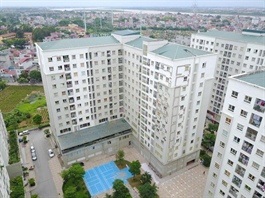MoF ponders plan to limit speculation
MoF ponders plan to limit speculation
Concerns are being raised about the proposal to increase taxation imposed on real estate transactions and leasing and whether it could be an effective tool to prevent real estate speculation.

The Ministry of Finance is collecting opinions from sectors and authorities on setting up the Law on Asset Tax and putting additional taxes into the current regulations. According to associate professor Dinh Trong Thinh from Vietnam Academy of Finance, however, Vietnam needs more research to deploy proposed taxes appropriately.
“To apply property tax to the second house upward, it is necessary to be transparent on all aspects, such as the financial source of that asset and how the income is. If the database of that asset is not closely controlled and transparent, that tax will be inaccurate. In addition, property tax must be considered in the same picture with a variety of other taxes, and especially those which relate to people’s income,” Thinh said.
“The rush to tax property at this time will cause consequences such as slowing down the real estate market,” Thinh added. “The spending of every family is increasing too fast, while the income is decreasing, this tax disturbs people’s lives, especially for those with reduced income.”
Mai Duc Toan, director of sales and marketing at CNT Group, commented that despite those taxes being proper, in reality, the enforceability of tax collection for rental apartments is modest.
“The majority of rental apartments are individuals and many landlords have sought to evade taxes by signing a rental contract without charge, or signing two-price agreements. The tax will be based on the lower price contract,” Toan said.
He also said that taxation authorities face difficulties collecting the correct tax amount when most people use cash.
Lawyer Nguyen Duc Nghia, director of the Legal Advisory Centre of the Ho Chi Minh City Business Association, acknowledged that collecting tax from rental houses is necessary. However, it is essential to adjust the policy on personal income tax in the direction that rent should be deducted when paying the personal income tax of tenants, or business households can be deducted rent when paying taxes.
Meanwhile, many landlords expressed that if the proposal to apply tax on house rental goes ahead, they would add this tax into the rents offered to tenants.
“If this tax is imposed at this time, the landlord will bear the tax to retain customers and accept reduced profits. When the apartment rental market picks up again, I may consider adding this tax to the rental price, or agree to a 50-50 share with the tenants,” said Nguyen Minh Duong, a landlord in the Thu Duc area of Ho Chi Minh City.
In fact, the tightening of taxes not only affects tenants but also has an impact on the real estate market. “More taxation will not only help keep speculators away but it can also make many people hesitant to enter transactions with houses and land,” said Nguyen Quoc Hiep, chairman of GP Invest.
If this tax is widely applied, the growth rate of house and land prices will slow down, but the real estate market will also be less exciting, Hiep added. “This will affect the economy in general, especially as we try to make the real estate market better and broader by focusing on developing large urban areas.”
A series of solutions to tighten the taxation for real estate transactions and renting have been planned since the third quarter of 2021.
Hanoi and Ho Chi Minh City tax departments are implementing a plan to tighten the collection of taxation on owners for renting houses. Taxation of rental incomes is not new in Vietnam, but it is a regulation that is rarely enforced or complied with. Under the Ministry of Finance’s regulations, landlords with an annual rental income of over VND100 million ($4,300) are subject to a 5 per cent VAT and the same in personal income tax.
Apart from this, Hanoi Department for Taxation last year also proposed to impose a tax on unused houses. Accordingly, a finished but unused villa for three months will be charged a tax of 5 per cent of its value, or 10 per cent if left unused for one year. The capital city also proposed to apply progressive tax collection for buyers who have two houses or more.
Meanwhile, the Ho Chi Minh City Real Estate Association suggested the taxation authorities apply an additional tax on transactions for houses and land plots in the first year, in an aim to limit speculation in the market.



















